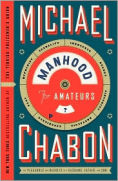Chabon has become one of my favorite writers, ever since my book club persuaded me to pick up Kavalier & Clay. I like his essays even more than his novels. Their mix of personal experience, political and cultural trends, self-deprecating humor, and startling insight is fascinating. I find myself nodding in recognition as I read each one and am always moved by the time I get to the end.
In this 2009 collection, he delivers a multi-faceted portrait of a man, his dreams and fears, his joys and regrets. Many of the short pieces start from his experience as a father, as he questions what he himself has experienced as a brother, son and husband, and how that can inform his dealings with his sons and daughters.
In “William and I”, he recalls his father’s distrust of intimacy and resulting distance, both physical and emotional—typical of most fathers in the mid-twentieth century. Chabon considers the low bar set for being a good father and the “monumental open-endedness of the job” of being a mother, a double standard where he is praised for grocery shopping with his baby while such things are routine expectations of mothers. In striving to hold himself to the same standard as a mother would be judged by, he recognises that he, like they, will “fail every day in my ambition to do the work, to make it count, to think ahead and hang in there through the tedium and really see, really feel, all the pitfalls that threaten my children.”
Many of the essays take him back to his own childhood. He delves into his boyhood in Columbia, Maryland, a planned community halfway between Baltimore and Washington and an amazing place to be a child, especially in its early days. In his earlier essay collection, Maps and Legends, Chabon describes the thrill of being in at the creation of something entirely new and the creative impulses the experience unleashed in him. Here he looks at relationships, such as in “The Splendors of Crap” where he treats us to his relationship with the Megginson family and the creative adventures they got up to, many based on Planet of the Apes.
In these short pieces, Chabon often teases out some of the sources of his writing. In “The Story of Our Story” he reminds us of Scheherazade’s sister who was the one who actually asked for a story each night. He then goes on to describe the moment his brother Steve was brought home from the hospital. At five, Chabon had experiences under his belt, “But it was not until that morning, in early September 1968, that my story truly began. Until my brother was born, I had no one to tell it to.”
Much of the joy I felt reading this collection came from the way Chabon takes common experiences and helps us see the depth and complexity within them. For example, in “Normal Time” he looks at the impulse to think of the chaos of daily life with its alarms and excursions as temporary, that things will get back to normal soon. There is some beautiful writing as he examines how time folds in on itself, much as each essay here does, before celebrating this life, this moment in all its glorious mess.
Even if you didn’t grow up, as I did, roaming the woods, reading comics, and watching Star Trek, you will find much to delight and intrigue you here.
Have you read an essay collection that enchanted and entertained you?

Yes I have. James Michener’s Tales of the South Pacific first springs to mind. And Ray Bradbury’s Dandelion Wine…which…oops! I think is your copy. Maybe not.
Not my copy, or maybe I replaced it–who knows? I think they are both classified as fiction, though with strong autobiographical elements.